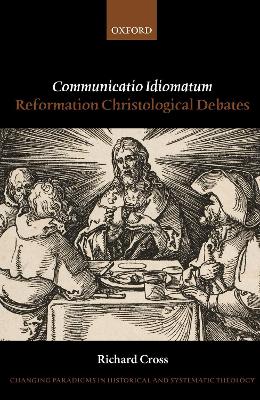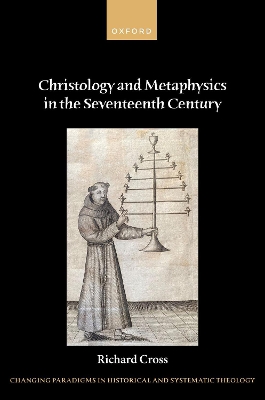Changing Paradigms in Historical and Systematic Theology
2 total works
This study offers a radical reinterpretation of the sixteenth-century Christological debates between Lutheran and Reformed theologians on the ascription of divine and human predicates to the person of the incarnate Son of God (the communicatio idiomatum). It does so by close attention to the arguments deployed by the protagonists in the discussion, and to the theologians' metaphysical and semantic assumptions, explicit and implicit. It traces the central
contours of the Christological debates, from the discussion between Luther and Zwingli in the 1520s to the Colloquy of Montbeliard in 1586.
Richard Cross shows that Luther's Christology is thoroughly Medieval, and that innovations usually associated with Luther-in particular, that Christ's human nature comes to share in divine attributes-should be ascribed instead to his younger contemporary Johannes Brenz. The discussion is highly sensitive to the differences between the various Luther groups-followers of Brenz, and the different factions aligned in varying ways with Melanchthon-and to the differences between all of these and the
Reformed theologians. By locating the Christological discussions in their immediate Medieval background, Cross also provides a comprehensive account of the continuities and discontinuities between the two eras. In these ways, it is shown that the standard interpretations of the Reformation debates on
the matter are almost wholly mistaken.
contours of the Christological debates, from the discussion between Luther and Zwingli in the 1520s to the Colloquy of Montbeliard in 1586.
Richard Cross shows that Luther's Christology is thoroughly Medieval, and that innovations usually associated with Luther-in particular, that Christ's human nature comes to share in divine attributes-should be ascribed instead to his younger contemporary Johannes Brenz. The discussion is highly sensitive to the differences between the various Luther groups-followers of Brenz, and the different factions aligned in varying ways with Melanchthon-and to the differences between all of these and the
Reformed theologians. By locating the Christological discussions in their immediate Medieval background, Cross also provides a comprehensive account of the continuities and discontinuities between the two eras. In these ways, it is shown that the standard interpretations of the Reformation debates on
the matter are almost wholly mistaken.
Richard Cross explores the largely uncharted territory of seventeenth-century Christology, paying close attention to its metaphysical and semantic presuppositions and consequences. He shows that theologians of all stripes develop and expand theories that are associated respectively with the medieval theologians Thomas Aquinas and Duns Scotus. Italian and French Dominicans follow Aquinas closely, read through the lens of Cardinal Cajetan. But most Iberian Dominicans
incorporate Suárez's theory of modes into their account, and Suárez, whose account is a modification of Scotus's, is in turn followed by his fellow Jesuits. Lutherans use Cajetan's account to fill explanatory gaps in their own accounts; and Reformed theologians by and large adapt the position
associated with Scotus. The study ends with an account of Leibniz's Christology in its historical and conceptual context.
incorporate Suárez's theory of modes into their account, and Suárez, whose account is a modification of Scotus's, is in turn followed by his fellow Jesuits. Lutherans use Cajetan's account to fill explanatory gaps in their own accounts; and Reformed theologians by and large adapt the position
associated with Scotus. The study ends with an account of Leibniz's Christology in its historical and conceptual context.

